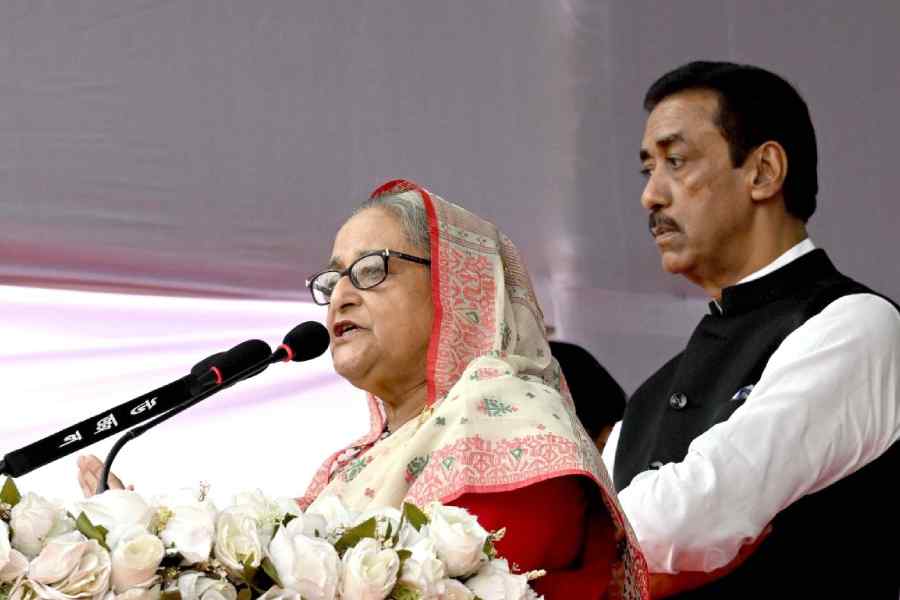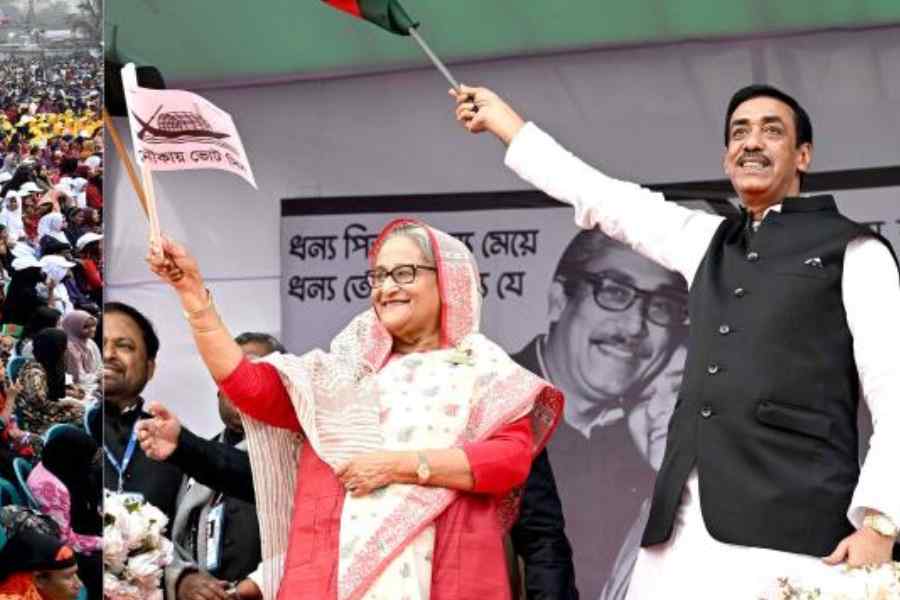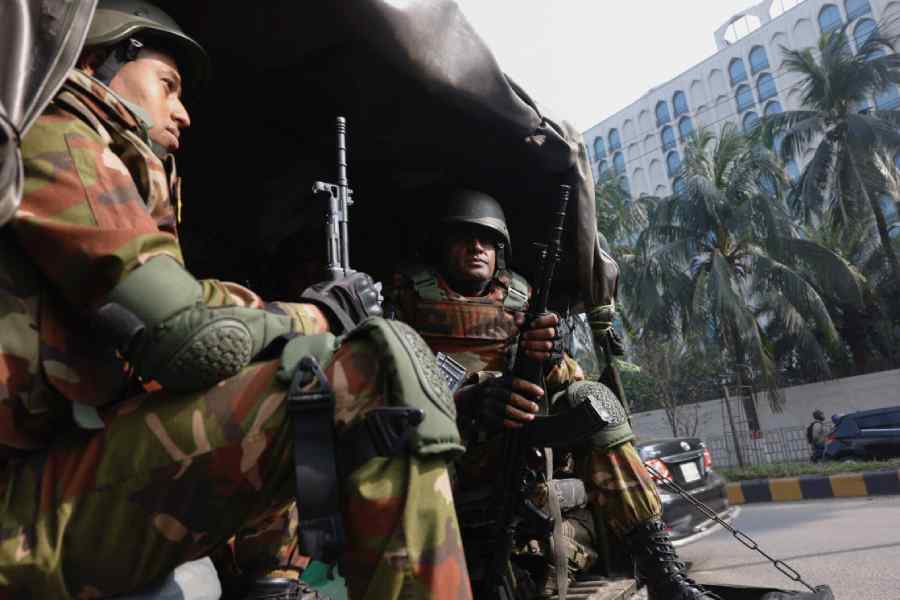Prime Minister Sheikh Hasina on Thursday urged Bangladeshis to cast their vote on Sunday and prove that democracy prevails in the country, the appeal coinciding with a call by main Opposition Bangladesh Nationalist Party for a 48-hour nationwide strike beginning Saturday morning.
Results of the 12th general election in Bangladesh are likely to start coming from Sunday night, hours after the polling, and the outcome is expected to be clear by Monday morning.
“All of you will go to the polling station, cast your votes, and prove that democracy prevails in Bangladesh,” Hasina urged voters at a late afternoon rally in Narayanganj, around 30km from capital Dhaka.
Earlier in the day, BNP senior joint secretary-general Ruhul Kabir Rizvi gave the strike call at a virtual news conference.
“The 48-hour hartal will be held in favour of the poll boycott and the non-cooperation movement for the resignation of the Awami League government, the reinstatement of a neutral poll-time caretaker government system, and release of BNP leaders from prison,” he said.
Rizvi said the public had no interest in the election.
Scenes at the Narayanganj rally and the roads leading to the venue — though not necessarily representative of the whole country — did not corroborate this theory. Tens of thousands thronged the Shamsuzzoha Sports Complex, the rally venue, chanting “Joy Bangla”.
Several media outlets reported that interest in the general election had peaked despite initial reservations among a segment of the population.
“We organised this rally in just four days as the Prime Minister wanted to come and address the people of Narayanganj.… Look at the turnout,” said Shamim Osman, the local MP.
Osman is said to have coined the “Khela hobe (The game is on)” slogan around 2013-14 in the context of a local election, before Bengal chief minister Mamata Banerjee and her party used it to spectacular effect in the run-up to the 2021 Assembly polls in Bengal.
With campaigning set to end at 8am on Friday, and the threat looming of the BNP scaling up its protests over the next 60 hours, there was considerable interest in Hasina’s address at Narayanganj. It was the last of the nine rallies the Prime Minister addressed during the 16-day campaign window.
“There were a lot of conspiracies to derail the election. Attempts to derail the poll process are still going on,” Hasina said.
“Since they (the BNP) cannot win the election, they are trying to deny the people the right to vote,” she added, alluding probably to the strike call by the BNP, which is carrying out an extensive poll boycott programme across the country.

Bangladesh Prime Minister and Awami League president Sheikh Hasina addresses an election rally in Narayanganj on Thursday Picture: Awami League
The Islami Andolon Bangladesh, a fringe political force that pursues an Islamist agenda, too held a news conference on Thursday and repeated the poll boycott call given by the BNP.
Amid the boycott calls and the allegations from a section of civil society that the election is “a sham” and a “friendly match between the Awami League and its allies”, the biggest question ahead of the election relates to the final voter turnout.
In the 2014 elections, which too the BNP boycotted, the turnout was a little over 39 per cent. Five years later, the turnout witnessed a spike to a little over 80 per cent. However, there were allegations of large-scale rigging by the Awami League that prompted the BNP to pull out of the race from most constituencies on polling day.
With the controversies around the last two elections having led to increased interest in the polls this time, the Awami League leadership is trying its best to ensure a turnout of around 40 to 50 per cent, a ruling party source said.
“The poll outcome is known: Hasina will win.… The only surprise element about the election is the voter turnout,” a veteran journalist said.
“The BNP is trying its best to ensure the lowest possible turnout so that it can demand that the election be countermanded, while the ruling party is desperate for a decent turnout as it wants this election to be regarded as a legitimate one.”
Hasina devoted a substantial part of her Narayanganj address to explaining the Awami League’s commitment to democracy. She recounted the 52-year-old country’s chequered history of political assassinations, three coups and some 19 to 21 failed coups.
She alluded to the country’s experience with army dictators Ziaur Rahman (who later gave up his uniform to float the BNP) and H.M. Ershad (the man behind the Jatiya Party).
“In the past, there were attempts to subvert the democratic process, with military dictators stripping people of their voting rights and confining the process to the cantonment. It was the Awami League that restored the people’s right to vote,” Hasina said.
“The democratic tradition is continuing from 2009 to 2023.… Now we are in 2024. As this democratic tradition is thriving, the country has progressed so much.”
The Prime Minister then reeled off statistics on the country’s transition from power-starved to power-surplus, and from famines to self-sufficiency in food.
Her stress on the Awami League’s history of commitment towards democratic values made it clear she was addressing the international community, especially the US-led Western bloc that has raised questions about the poll process in Bangladesh.
Sources in the ruling party said that instructions had been sent out from the highest echelons to party functionaries that there should not be any vitiation of the poll process on January 7.
“Some Awami League candidates, including ministers, are facing tough fights from dissidents contesting as Independents.... The message from the top is that the polls have to be free and fair, even if it results in the loss of the party’s official nominee,” an Awami League source said.
This promise of free and fair polls is meaningless, a civil society member said. “Whoever wins, he or she will be part of the Awami League family.… So, this charade of competitiveness means nothing,” he said, asking not to be identified.
There are allegations that the ruling party plans to use the government machinery to force voters to go to the booths.
This came up during a meeting that chief election commissioner Kazi Habibul Awal held with foreign diplomats based in Dhaka. Awal dismissed the allegations.
“The Prime Minister has done extensive campaigning for the polls, covering 163 constituencies out of the 300, either virtually or through public meetings.… This is going to be a democratic and free and fair election,” said Biplab Barua, office secretary with the Awami League and special secretary to the Prime Minister.











